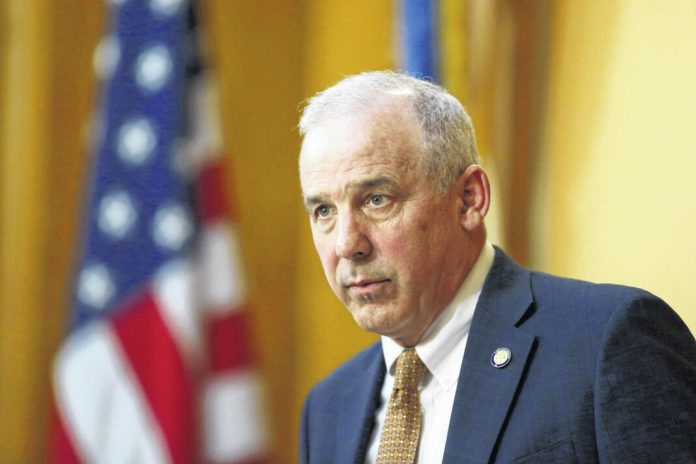COLUMBUS – At the height of its sweeping Statehouse bribery scheme, FirstEnergy secretly paid $300,000 over five checks to a dark money nonprofit its lobbyist explicitly associated with now-Senate President Matt Huffman, new records show.
In May 2019, a 501(c)(4) nonprofit FirstEnergy funded and controlled wrote the first of its checks to a fellow dark-money group called Liberty Ohio, a group FirstEnergy lobbyist Ty Pine referred to in an email as “the Huffman C4.” Dark-money nonprofits can raise limitless amounts of money without disclosing their contributors. At the time, Huffman was a state senator, understood to be next in line to ascend to his current role as Senate President, one of the most powerful jobs in state politics.
Huffman, R-Lima, has never been implicated in what has turned into a sprawling bribery scandal. But newly released records show FirstEnergy organizing secret payments to benefit him politically, just as they do with Gov. Mike DeWine and Lt. Gov. Jon Husted, the beneficiaries of about $4.3 million in documented FirstEnergy money across multiple similar groups. Neither DeWine nor Husted has been accused of criminal or civil wrongdoing either.
Huffman, through a spokesman, said he has never “created, controlled or coordinated” any 501(c)(4).
“The effort to interpret five-year-old emails from campaign operatives and lobbyists wrapped in hyperbole, big talk and false assumptions is just that, hyperbole, big talk and false assumptions,” said spokesman John Fortney.
At the center of the bribery scandal is House Bill 6, the 2019 legislation that delivered a bailout worth more than $1 billion to FirstEnergy. A former Ohio House speaker is serving 20 years in prison for accepting FirstEnergy’s bribes. Two former FirstEnergy executives face felony state charges over a separate but related bribery case involving the state’s former top utility regulator.
FirstEnergy money start flowing to Liberty Ohio on May 29, 2019, when records show Partners for Progress, a nonprofit FirstEnergy funded and controlled, wrote the first of what would be three $50,000 checks that year. In June 2020, Partners for Progress transferred another $150,000 to Liberty Ohio.
About two weeks before that first check, Ray Yonkura, a political operative with High Bridge Consulting, emailed Pine, a longtime FirstEnergy lobbyist, with a PowerPoint “overview” of Liberty Ohio, an opaque organization with almost no public-facing profile. Pine forwarded the email to FirstEnergy lobbyist Joel Bailey, who sent it on to Michael Van Buren, a Northeast Ohio attorney who served as treasurer for Partners for Progress.
“Is this what you need on the Huffman C4?” Pine wrote.
At that time, FirstEnergy was waging, by its own admission, two distinct multimillion dollar bribery schemes involving ex-Ohio House Speaker Larry Householder and top state utility regulator Sam Randazzo. In exchange, the two men offered critical support passing HB6, which charged ratepayers statewide more than $1 billion to subsidize FirstEnergy’s money-losing nuclear plants. Passage of the bill, prosecutors say, was the culmination of the biggest public corruption scheme in Ohio history.
The connections between Huffman, Liberty Ohio, and FirstEnergy have not been previously reported.
One day before Partners for Progress wrote the first Liberty Ohio check, Van Buren emailed the nonprofit’s board, plus Bailey, stating that Partners for Progress was “requested” to contribute to Liberty Ohio. This and other documents, originally produced in an investor lawsuit filed against the company in connection with the scandal, were recently obtained by public records request.
The day after Partners for Progress wrote the first $50,000 check, FirstEnergy lobbyist and vice president Mike Dowling texted CEO Chuck Jones, saying “we’re going to need some C(4) infusion.” Jones asked how much to get through the year.
“(FirstEnergy lobbyist) Danny McCarthy was on my a— last night about giving to Matt Huffman – the next Senate President,” Dowling wrote. “He wants us to give him A LOT. Why? Because Huffman is transactional and can get shot (sic) done. And when that happens, it helps the governor because it just makes things easier.”
Yonkura did not respond to a call or email. Thomas Datwyler, listed as the principal officer for Liberty Ohio on its tax records, didn’t respond to a voicemail.
Jones and Dowling have both been accused of bribing Randazzo. They have pleaded not guilty. Randazzo died by suicide earlier this month, as he was facing trial on state and federal bribery charges. FirstEnergy agreed to pay a $230 million penalty, cooperate with investigators, and publicly admit that dark money political contributions were “central” to its bribery scheme.
Householder is serving a 20-year sentence for racketeering. Ex-Ohio Republican Party chairman and lobbyist Matt Borges, who was convicted at trial, is serving a five-year sentence for racketeering. FirstEnergy Solutions lobbyist Juan Cespedes and Householder adviser Jeff Longstreth both pleaded guilty and are cooperating with prosecutors. They have not been sentenced. A fifth conspirator, lobbyist Neil Clark, died by suicide in 2021.
During the Householder investigation, two undercover FBI officers engaged with Clark seeking to make dark money contributions to various 501(c)(4) organizations. In recorded calls with the undercovers, Clark said “Matt Huffman has his (c)(4) already set up.” However, a spokesman at the time the tape was played at Householder’s trial said Huffman never controlled any 501(c)(4) nonprofit.
Clark, in the tapes, also offered the undercovers a sense of the value an ally like Huffman can deliver.
“Matt Huffman, he’s a Senator. He’s going to be the next Senate President,” he said. “He has eighteen votes in the Senate. Of the 24 Republicans, he has 18.”
Cespedes, in a January 2019 text message to FirstEnergy Solutions lobbyist Bob Klaffky, indicated after a meeting that Huffman was warmer on a nuclear bailout than was foreseen.
“Matt Huffman is much stronger on our issue than I expected,” he said. “He could be our champion in leadership. He hates wind energy.”







